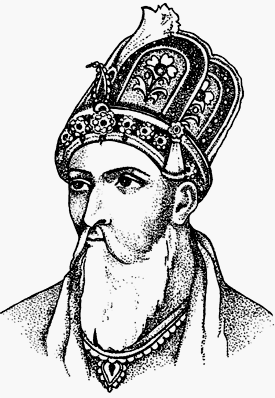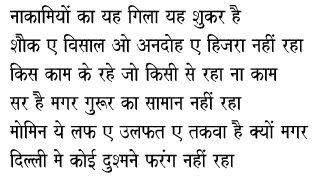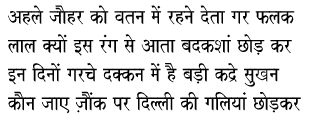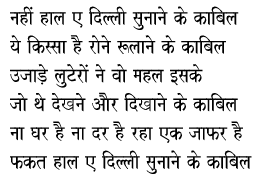|
 The last monarch of India, Bahadur Shah Zafar was a gentle soul. He could not fight the British. He could not rise to the occasion. He was spoiled. He was used to a life of utter luxury. He failed to champion the cause of the freedom struggle of 1857. All these and many more legitimate allegations cannot wipe off the fact that Zafar was a patriot. He hated the British rule. He craved for restoring India's honour. He simply loved India. As we go through the poems written by Zafar and his contemporaries, we find that these great Urdu poets were genuine patriots. Their poetry breathes the simmering anger, despair and revolt against the British rule. Their's is a story of helplessness of simple souls before the cunningness and brutality of the more mechanized and organized lot. The last monarch of India, Bahadur Shah Zafar was a gentle soul. He could not fight the British. He could not rise to the occasion. He was spoiled. He was used to a life of utter luxury. He failed to champion the cause of the freedom struggle of 1857. All these and many more legitimate allegations cannot wipe off the fact that Zafar was a patriot. He hated the British rule. He craved for restoring India's honour. He simply loved India. As we go through the poems written by Zafar and his contemporaries, we find that these great Urdu poets were genuine patriots. Their poetry breathes the simmering anger, despair and revolt against the British rule. Their's is a story of helplessness of simple souls before the cunningness and brutality of the more mechanized and organized lot.
Zafar and his contemporaries were quite different from the British. They lived in a world of honour, generosity, poetic replies, and beauty. The British had the sole aim of exploiting India. They eyed the riches of this nation. Their army was mechanized. Their sense of business was strong. The British had not come to India for listening shers, ghazals and quitaats. What we find here is a complete contrast of approach between the two forces. What Mangal Pandey and Laxmi Bai had, was instant valour. But even that did not work with the British. Bahadur Shah Zafar was not good at arms. But it does not mean that he was not patriotic. His heart cried for India. The concept of the physical entity called India was taking a definite shape during those days. Zafar was one of the first champions of this idea of Indianhood.
Once, someone taunted Zafar by saying :
Dumdamein Mein Dum Nahin Khair Maango Jaan Ki
Aey Zafar Thandi Hui Shamsheer Hindustan Ki

(Your fort is crumbling down, pray for your life.
The Indian sword, O Zafar, has lost its sheen and might)
Zafar replied back:
Gajiyon Bein Boo Rahegi Jab Tak Imaan Ki
Tab To London Tak Chalegi Teg Hindustan Ki

(So long as the soldiers retain their faith and pride
The Indian sword will not relent till it humbles (London's might);
The British naturally targetted Zafar. He had to pay a heavy price for his espousal of the first war of India's Independence. In this war, he not only lost his empire but his sons and nephews as well. Zafar has penned the Birish rampage effectively in this poem:
Ye Riyaya E Hind Tabah Hui Kahun Kya Jo In Par Jafa Hui
Jise Dekha Hakiye Waqt Ne Kaha Ye To Kabile Dar Hui

(The Indian people were brought to ruin by the ruling lords
They thought him fit for the gallows, anyone they came across)
The concept of the physical entity called India was being formed around 1857. Although each ruler was confined and attached to his/ her own little kingdom, still, a wave of common culture and heritage ran through the country. Wherever the British ruled was identified as India. The British did not rule China at that particular juncture, therefore that region and other surrounding areas were out of the general consciousness regarding the concept of India. It was a unique point in the history of India when the idea of modern nation-state was being established. Nationality, nationhood and patriotism were new concepts in the sense that earlier people knew that they had to be loyal to their local ruler and that was all. All that was required was solidarity with the local zamindar, talukedar or king. In this steady growth of the ideal of India, Delhi occupied an important place. The city of Delhi was being recognized as the centre of political activities in India.
Attachment with Delhi became a symbol of attachment with the nation. It reflected the first post-colonial protests of the Indian mind. London versus Delhi, 'firangi' versus 'desi' - the conflict symbolized revolt of the Indians. The Urdu poets eulogized Delhi in their poems. The poems centered around the city of Delhi, the concept of Delhi hood and the people of Delhi are not simple praise for the city; they stand for India's voice against the Biritish.
Zafar again and again expresses his ire against the rising British excesses on Indian soil:
Na Tha Shahr Dilli Ye Tha Chaman Vaale Sab Tarah Ka Tha Yahan Aman
So Khitab Iska Lut Gaya Fakat Ab To Ujda Dayar Hai

(Delhi was a garden city with plenteous peace replete.
Denuded of its status grand, it is now a wasted health).
Momin writes in a different vein. In the following lines, he articulates the conditions of despair and hopelessness in Delhi:
Naakamiyon Ka Yeh Gila Yeh Shukr Hai
Shauk E Visaal O Andoh E Hijra Nahin Raha
Kis Kaam Ke Rahe Jo Kisi Se Raha Na Kaam
Sar Hai Magar Garoor Ka Samaan Nahin Raha
Momim Ye Laf E Ulfat E Takwa Hai Kyon Magar
Dilli Mein Koyee Dushmanein Firang Nahin Raha

(I now acclaim and now denounce my failures and defeats.
The Zest of union, grief of severance, both have taken leave.
What's the use of your existence, if you lead a life detached.
You have the head but no reason to be proud of yourself.
Why do you feel proud, Momin of your love of pious ways,
you cannot find one anti-British now on the streels of Delhi.)
Similarly, Zauq's love for Delhi is worth quoting:
Ahle Johar Ko Vatan Mein Rahne Deta Gar Falaq
Laal Kyon Is Rang Se Aata Badkashan Chod Kar
In Dino Garche Deccan Mein Hai Badi Kadre Sukhan
Kaun Jaaye Zauk Dilli Ki Galiyan Chod Kar

Could talent live at home and thrive,
why should the badakhshaan ruby wander world-wide,
Albeit in Deccan, Zauq, the Muse commands respect,
who would quit the lanes of Delhi and suffer exile?
In one of his quitaats, Zafar cries for Delhi:
Nahin Haal E Dilli Sunane Ke Kaabil
Ye Kissa Hai Rone Roolane Ke Kaabil
Ujaade Luteron Nein Voh Mahal Iske
Jo The Dekhne Aur Dikhane Ke Kaabil
Na Ghar Hai Na Dar Hai Raha Ek Zafar Hai
Fakat Haal E Dilli Sunane Ke Kaabil

Not worth narrating is Delhi's tale,
It will make us weep and wail;
Such palaces have the raiders razed
which were a sight to see and praise.
None is left to tell this tale,
Except Zafar, the unfortunate!
All the poets of this generation, Zafar, Ghalib, Zauq and Momin, cherished a deep love for the country in their hearts. K.C. Kanda, a Zafar scholar, says,
'..........Zafar was a patriot and a patron of arts, who had given a new shape to the poetical and political culture of the day. Though, because of his temperamental docility and circumstantial compulsions he could not boldly champion the cause of the 1857 revolt, yet he was, for all practical purposes, a symbol of rebellion and a rallying point for the discontented Indian people raring to cast off the yoke that, they knew, was getting slowly but surely tightened around their necks. In the heart of hearts, Zafar was a rebel and a true patriot. [1]
Zafar again and again cries against the slavery of the British:
O Aa Gaye Is Mahale Teera Rang Mein
Kaide Hayaat Se Hai Voh Kaide Firang Mein

(He who is an inmate of this place dark,
Is a prisoner of the British just for this fault)
These lines depict Zafar's own imprisonment. He is a slave just because he is an inhabitant of the place. He very well understood the loot of India. The cruelty of the British finds expression in his poetry.
Jahan Veerana Hai Pahle Aabaad Yahan Ghar The
Shaghaal Aab Hain Jahan Baste Kabhi Baste Bashar Yahan The

(There where you see the wilds, bustling towns did once thrive
where jackals prowl and roar, men and women lived in pride)
The jackals here are the British. Reading these poems, one forms a sharp image of the British: Cunning, cruel and calculated.
Self-respect was the trade mark of these poets. They were scholars. They shunned British jobs. Kanda tells,'...Momin was averse to seeking personal favours through flattery or sham praise... he had also declined (like Ghalib) the poet of a professor at Delhi College....(2) This Delhi College later took the shape of Delhi University. We, with our 21st century eyes, cannot easily see as to why these great scholars and poets declined professorship. But for them, it was slavery and worse still, slavery of the British. They lived in their own world. Unfortunately they could not die in their own world. The famous lines of Zafar echo:
Kitna Hai Badnaseeb Zafar Dafan Ke Liye
Do Gaz Zameen Bhi Na Mili Ku E Yaar Mein

(How unlucky is Zafar, mark! for his burial place.
He couldn't find two yards of ground in his lovers street.)
This love's street is India. In fact, the whole of this poem is an Indian's cry to reach back his motherland. The last days of Zafar at Rangoon filled his poems with unfathomable pain. He feels restless at an alien land:
Lagta Nahin Hai Dil Mera Ujde Dayaar Mein
Kiski Bani Hai Aalamein Na Paedaar Mein

(I feel ill-at-ease on this wasted heath,
who is this ephemeral world has ever found relief)
In fact, it is very easy for any country to admire its victorious heroes. Those who took the sword like Laxmi Bai or Mangal Pandey or those who finally won freedom like Nehru and Gandhi are national heroes and very correctly so. But it takes tremendous amount of courage and confidence to accept our fallen heroes. To realize that he last monarch of India was not a warrior but nevertheless a great Indian is desirable and even rewarding. Zafar and his contemporaries played their role in spreading national awareness. They suffered at the hand of the British. They preserved Indianhood in their hearts. From this point in the history of India, the British understood that they would need to divide this country on religious grounds if they had to rule her. The birth of the concept of nationhood was unfortunately coupled with the birth of the policy of 'divide and rule' which later resulted in India's Independence as well as her partition
References:
1. Kanda, K.C. 2007. Bahadur Shah Zafar and his Contemporaries. New Delhi. Sterling publishers Pvt. Ltd.3.
2. ______________.9.
Note:
The Urdu couplets have been collected over the years from a number of newspapers and magazines as well as books as Masterpieces of Patriotic Urdu Poetry (Sterling pub.) and Master Couplets of Urdu Poetry (Sterling pub). |